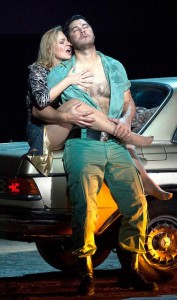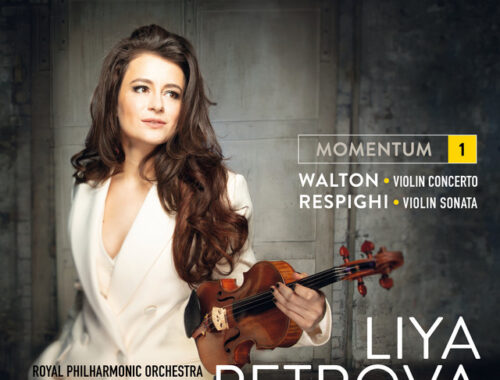Bizet “Carmen”, English National Opera, London Coliseum
 There are few directors who can realise the potential of bodies on stage as dramatically as Calixto Bieito. Toilet cubicles aside (and it says something of our national press that this has become the image most associated with him) his ENO production of Verdi’s A Masked Ball was one of the most physically exciting of that era. Now comes the Spaniard’s Carmen with the promise of heat, dust, blood, sweat, tears, and an automobile or five – and you might sum up the whole show with a moment in act one where the cigarette girls are languishing in the midday sun, their heads full of romantic notions of a better life, and their reveries are counterpointed with the vulgar come-ons of barrack’s soldiers on heat. The Spanish flag blows gently in the breeze and you know it’s only a matter of time before one of those girls is symbolically run up the self same flagpole. The sexual violence of man on woman is at the heart of Bieito’s staging.
There are few directors who can realise the potential of bodies on stage as dramatically as Calixto Bieito. Toilet cubicles aside (and it says something of our national press that this has become the image most associated with him) his ENO production of Verdi’s A Masked Ball was one of the most physically exciting of that era. Now comes the Spaniard’s Carmen with the promise of heat, dust, blood, sweat, tears, and an automobile or five – and you might sum up the whole show with a moment in act one where the cigarette girls are languishing in the midday sun, their heads full of romantic notions of a better life, and their reveries are counterpointed with the vulgar come-ons of barrack’s soldiers on heat. The Spanish flag blows gently in the breeze and you know it’s only a matter of time before one of those girls is symbolically run up the self same flagpole. The sexual violence of man on woman is at the heart of Bieito’s staging.
The first time we see Carmen she’s in a telephone kiosk probably trying to figure a way out of this dump – and then the crowds part and suddenly there’s Don José like something out of a Marlboro ad. Bieito is so good at those “reveals”. There’s a mirror image of that in the closing scene where the jubilant crowds outside the bullring part to reveal the golden suited Escamillo kneeling in contemplation before the fight, Carmen at his side. Don José was only ever short-term but all the signs in Bieito’s production are that he is distinctly bipolar. Adam Diegel certainly looks the part, hunky and then some, but it’s a pushed and grainy sound that only comes into its own at full-tilt where its cragginess can be exciting. His earlier persuasions – like the “Flower Song” – are pinched and short of phrase. Not so Ruxandra Donose’ Carmen whose creamy delivery both promises and delivers seduction with menace. And yet there’s a softness which at first seems inappropriate until you realise that the Carmen everyone expects her to be is partly the cover for a deeper desire – to fall in love and settle down. She protests that she will live free and die free but that tiny duet with Escamillo (the incisive Leigh Melrose) before the bullfight says otherwise.
But here’s the rub. So much of what Bieito does on his dramatically lit (Bruno Poet) open stage is at odds with the wordy and archly “English” translation of Christopher Cowell. The baseness, the earthiness, the sweaty physicality of it all is forever being undermined by words. Small wonder Bieito chose to dispense with almost all the dialogue. In his Carmen it’s the bodies – the sinewy physicality – that speak volumes. The ENO Chorus becomes a whole community and in the smuggling scene of act three overloaded automobiles become platforms and trampolines and the sounds of slamming doors gives way to a full-throated hymn to a good day’s work as the assembled crowd displays its Apple and Bosch and Dyson contraband. In the midst of that scene Elizabeth Llewellyn makes a real fist of Micaëla’s aria lending it an intensity and resolve that you rarely hear. She is totally the outsider, seeking but not finding acceptance, a go-between José and his mother and an obsession called Carmen.
But the production comes disturbingly into its own in the final scene. Donose and Diegel are terrifically good here as a second bullring is literally drawn in the sand and in the pit Ryan Wigglesworth really screws up the tension. There is a lovely touch where Carmen gently kisses José on the cheek – she has grown in her love for Escamillo and this is a fond “no hard feelings” farewell. Snatching and emptying her best handbag is suddenly then a terrible violation and when he violently kicks it away just as she is about to pick it up it is in its way even more shocking than the now inevitable violence to her person.
So an exciting show in many ways – and again splendid work from the ENO Chorus – but you really have to close your ears to some poncy words.


